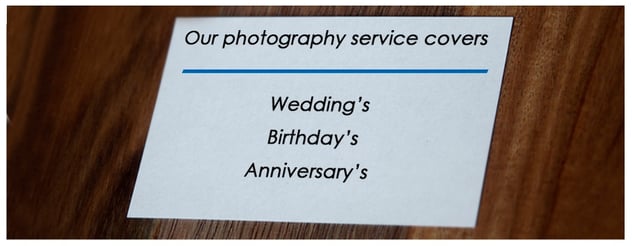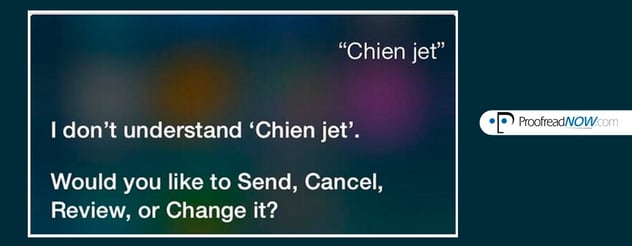While there are those who say grammar doesn't matter, surveys keep bearing out a simple reality: consumers actually do care about grammar.
Global Lingo found that 59% of adults in the U.K. would not use a company that had obvious grammatical or spelling mistakes in its content.
Standing Dog Interactive conducted a similar poll. It revealed that 58% of people are “very” or “somewhat” annoyed by typos and grammatical errors.
Even more revealing is the feedback some of the pollsters received. Take a look at what a couple of consumers said:
“If a company lacks attention to detail in their promotional material, it speaks volumes to me about their attention to detail in other areas.”
“If they are skimping on grammar, I wonder what else they are skimping on.”
As a marketer, your intention is to communicate a message to your audience. The voice with which you communicate is part of your particular “brand.”
The problem with grammar errors is that they undermine your intentions. They distract and repel your audience instead of draw them in. In short, they make your brand untrustworthy.
Here are four particular grammar mishaps that will immediately cast your brand in the wrong light.
1) Incorrect Apostrophe Use
Apostrophes are properly used in three ways:
- To show an omission of one or more letters (“Don’t” instead of “Do not”)
- To show possession (My friend’s bike; the dogs’ bowls)
- To show plurality of certain non-words, such as letters (as in “Mind your p’s and q’s”)
Number three is somewhat controversial; some would argue that the apostrophes in that example are used incorrectly.
However, no one would argue that the following is correct:

The presence of apostrophes in this example is inexplicable. Indeed, some consumers can forgive an occasional incorrect omission of punctuation, but they are left scratching their heads when they see punctuation that should never have come near a word.
It’s equally sloppy to misplace an apostrophe within a sentence. The proclamation “Your’e not alone” isn’t all that reassuring, is it?
2) Awkward Commas
For the most part, commas won’t hurt your brand. Consumers will brush off even technically incorrect comma use as long as the message is communicated well.
Comma abuse is real, though. There is absolutely no excuse for this:
Get it shipped directly, from, us to you!
In this sentence, the reader is jolted from the intended message. He or she will likely reread the sentence several times. You can be sure a shake of the head follows next.
The absence of a comma in key places is another brand killer. An old fake magazine cover showed the devastating potential of missing commas:
Rachael Ray finds inspiration in cooking her family and her dog.
3) Trusting the Ear Over the Mind
Many marketers are far too trusting of their own ears. When they want to write a word or phrase and are unsure how to do so, they follow the way of Apple’s Siri: they speak the word out loud and write exactly what they hear.

(Can you figure out what the person said to Siri? It was "Change it.")
This is what leads to grammar mishaps like these:
- Bathrooms are out of order. We are sorry for the in convenience.
- Apples are subbosably better for you than grapes, but we know better.
- You probably should of bought suntan lotion…
These mistakes have heavy consequences. Readers see you in one of two ways: too lazy to do a simple spell check or not educated enough to know you needed to. It doesn’t matter if these assumptions are true—they exist.
If you ever have a doubt about how to use a word or phrase accurately, take the time to research. Losing a minute out of your day far outweighs the hit your brand takes from careless publishing.
4) Loose-cannon Comparatives and Superlatives
A certain Orlando taxi service uses this slogan on the side of their vehicles:
Help us make America bigger and more better!
We didn’t make that slogan up. This business has genuinely advertised that content hoping it will connect with customers. Let’s just say they’re probably going to be disappointed.
Today’s consumer seems to be hyper-attentive to incorrect comparatives and superlatives. Juice companies cannot claim to use the “most tastiest” juice, even on the areas of the carton where most people don’t bother to look. You don’t want to say that your competitors are “averager” than you are.
Of course, plenty of brands invent superlatives in the attempt to sound fresh and appealing. Consumers love it when the companies they buy from are in on the joke. Just make sure you are.
Conclusion
The good news is that one mistake probably won’t destroy trust in your brand. Even the world’s most reputable publishing companies print errors. It happens; people understand that.
Yet there is a significant difference between shooting photos for “wddings” and shooting them for “wedding’s.”
One is a mistake; the other is a symptom.
Need some outside help to avoid these grammar mishaps? We’d love to help you keep your brand professional and spotless. Why not send us a document and see what we find that you may have overlooked? Click here to find out about our special offer.



